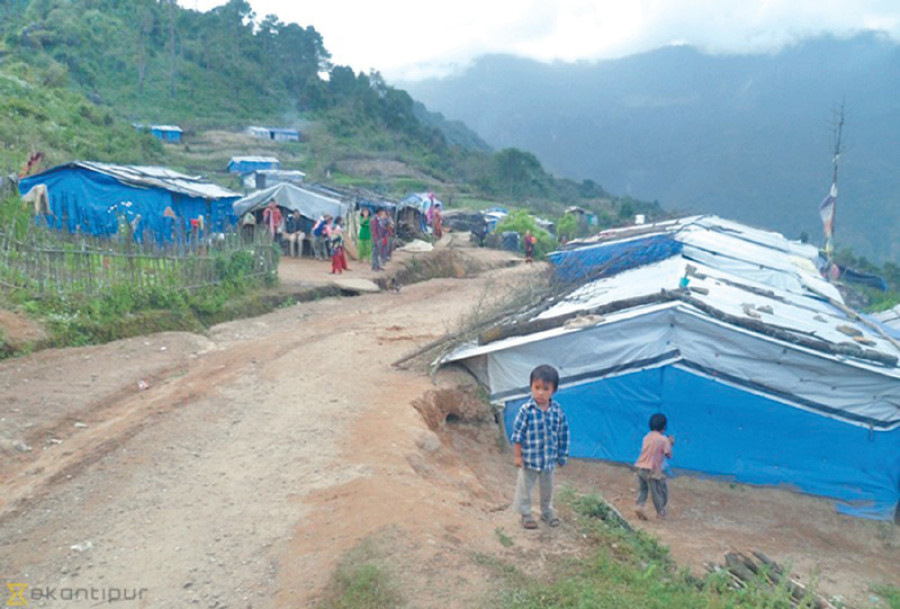Opinion
Reconstruction woes
Providing succour to earthquake survivors is a national priority as well as a humanitarian imperative
Maina Dhital
Another winter has arrived and so has misery in the lives of the survivors of the devastating earthquakes of 2015. Thanks to the opportunistic civil servants and political leaders, the situation has not changed much even after more than one and half years. The hopes of the victims and survivors, who went through a hellish time during last year’s harsh winter, have been shattered once again.
For the second year in a row, quake-victims are going to have to live in plastic tents and zinc-roof-huts in the fields. The government has assigned to 2,700 technicians the reconstruction works in the districts hardest hit by the earthquakes. However, the already slow recovery from the devastating earthquake has now ground to a halt with the fresh strike announced by the technicians and engineers—a callous decision to fulfil their personal interests. Their major demands include bonuses, insurance, separate offices in the field and physical security, among others. This demonstrates that the civil servants themselves are not serious about helping the quake-affected, and it has resulted in an unfortunate situation.
Slow pace
According to the National Reconstruction Authority (NRA), the construction of only 8,333 houses has been completed in last one and half years, a mere 1.67 percent of the total destroyed houses. The Post-Disaster Needs Assessment (PDNA) report states that about 498,852 private houses, 2,656 government buildings, and more than 19,000 school classrooms were completely destroyed after the devastating earthquakes. The government had initially announced Rs200,000 in housing aid in three instalments to around 7.5 million households. The Dahal-led government increased the aid amount to Rs300,000 in August.
However, achievements at the field level seem to be nominal, considering the time and resources spent by the government. The Dhurmus-Suntali Foundation, a philanthropic organisation initiated by popular artists Kunjana Ghimire and Sitaram Kattel, has already challenged the government on reconstruction works. The foundation was able to complete and hand over 65 earthquake-resistant houses in Giranchaur-8 in Sindhupalchok district in a span of four months. The foundation completed the ‘integrated settlements’ at a cost of Rs51.43 million. Earlier, it had completed a similar project in the district of Kavre.
According to the housing aid distribution guideline, eligible households can receive the first instalment of the aid only after the construction modality of the houses is approved and work on the foundation of the house starts. Households that complete rebuilding houses up to the plinth level following the government approved guidelines are eligible for the second instalment. The last instalment is set to be provided only after the completion of the house. Without the help of the technicians, people cannot receive the grant from the government.
With the first instalment of the aid, about 12,000 houses were just under construction in the most affected areas. Had the field technicians and other stakeholders cooperated to expedite construction, many families would have got new houses by the peak of winter. However, the strike has further delayed the reconstruction process. If the situation remains like this, it is possible that people will not get new houses even next winter.
Let's set aside differences
Earlier, the government had been unable to appoint the CEO of the NRA for a long time due to political bickering. Once the government made a political appointment, the NRA could not function efficiently due to the lack of cooperation from the bureaucracy, which further slowed down reconstruction for many months.
In order to implement the reconstruction works at full swing, the government needs to ensure a smooth working environment. The NRA should be provided with full autonomy. As providing succour to earthquake survivors is a national priority as well as a humanitarian imperative, the leaders of political parties, both at the centre and the local levels, need to fully cooperate with the NRA putting aside their political differences.
Similarly, the technicians on strike also need to reconsider their demands. In fact, they need to learn from Dhurmus and Suntali who made the challenging work possible through their hard work and dedication. Everyone knows how they let their career take a back seat to building houses for the quake-victims. The technicians get a regular salary and benefits. And as civil servants, it is also their duty to serve the country and the people, particularly in situations involving humanitarian concerns. Incentives for those who work hard such as the engineers are certainly important. But they are not as important as the lives of the victims.
The government should be sensitive to fulfil the technicians’ genuine demands such as insurance and physical security. Even though the NRA has agreed to provide some incentive, it seems that the slow process of implementation has irritated them. The government should intervene timely and ensure that the reconstruction process is handled efficiently from now onwards.
Dhital is a US-based freelance journalist




 13.85°C Kathmandu
13.85°C Kathmandu










